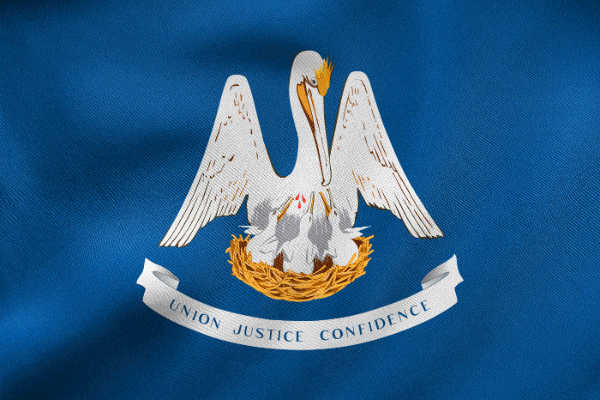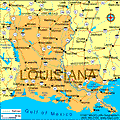Louisiana


Louisiana State Information
Capital: Baton Rouge
Official Name: State of Louisiana
Organized as a territory: April 30, 1803
Entered Union (rank): April 30, 1812 (18th state)
Present constitution adopted: 1974
State abbreviation/Postal code: La./LA
State Area Codes: 225, 318, 337, 504, 985
Fun Facts About Louisiana
Nickname: The Pelican State
Origin of name: Named in honor of King Louis XIV of France
Motto: “Union, Justice, Confidence”
Slogan: "Feed Your Soul"
Flower: Magnolia (1900)
Tree: Bald Cypress (1963)
Animal: Black Bear (1992)
Bird: Eastern Brown Pelican (1958)
Fish: White Perch (1993)
Vegetables: Sweet Potato (2003)
Gem: Crassostrea Virginica (Oyster Shell) (2011)
Colors: Blue, white, and gold (no official year)
Song: "You Are My Sunshine" (1977) and "Give Me Louisiana" (1971)
Poem: "The Louisiana" (2015)
Grass: Switchgrass (2014)
Fossil: Petrified Palmwood (1976)
Dinosaur: None officially designated
Cookie: None officially designated
Insect: Honeybee (1977)
Ballad: "The Louisiana Waltz" (2002)
Bilingual song: None officially designated
Question: None officially designated
Government
Governor: John Bel Edwards, D (to Jan. 2024)
Lieut. Governor: Billy Nungesser, R (to Jan. 2024)
Secy. of State: Kyle Ardoin, R (to Jan. 2024)
General Treasurer: John Schroder, R (to Jan. 2024)
Atty. General: Jeff Landry, R (to Jan. 2024)
Senators: John Kennedy, R (incumbent); Bill Cassidy, R (in office to Jan. 2027)
Historical biographies of Congressional members
Official State Website: http://www.louisiana.gov/
Population
Residents: Louisianians
Resident population: 4,590,241 (25th Largest State, 2022)
10 largest cities (2023): New Orleans, 391,006; Baton Rouge, 220,236; Shreveport, 187,112; Lafayette, 126,185; Lake Charles, 78,586; Kenner, 66,655; Bossier City, 68,159; Monroe, 47,877; Alexandria, 46,180; Houma, 33,727.
Race/Ethnicity: White (59.0%); Black (32.4%); Native American (0.8%); Asian (1.9%); Other race (2.4%); Two or more races (3.5%); Hispanic/Latino (5.6%).
Religion: Protestant (60%); Catholic (28%); No religion (8%); Other Christian (1%); Jehovah's Witness (1%); Buddhist (0.5%); Muslim (0.5%); Hindu (0.5%); Other religions (1%).
Sex: Male: 2,282,482 (49.0%); Female: 2,375,275 (51.0%).
Age: Under 18: 1,040,000 (22.3%); 18-64: 2,900,000 (62.3%); 65 and over: 717,757 (15.4%). Median Age: 36.8.
Economy
GDP: $281.43 billion (24th in U.S., 2022)
Unemployment: 3.4% (2023)
Geography
Land area: 43,204 sq mi. (111,898 sq km)
Geographic center: In Avoyelles Parish, near Marksville
Number of counties: Louisiana is divided into 64 parishes (equivalent to counties in other states)
Largest parish by population and area: East Baton Rouge, 440,059 (2020); Plaquemines, 2,429 sq mi.
State forests: 8
State parks/recreation areas: 21
Louisiana, fondly known as the “Pelican State”, offers a vibrant mix of cultures, landscapes, and traditions that are deeply rooted in its history. The state capital, Baton Rouge, the populous city of New Orleans, and other cities like Shreveport and Lafayette each contribute to the state's unique character. The state government, led by the governor and the lieutenant governor, works closely with local governments and state agencies, like the Louisiana Workforce Commission and the Department of Public Safety, to ensure a safe and prosperous state.
Louisiana Geography
Louisiana is best recognized for its expansive wetlands and the grand Mississippi River that gracefully carves its way through the state. The Atchafalaya National Heritage Area represents a significant portion of this river-centric landscape. The state's northern region is marked by rolling hills and the city of Monroe. Baton Rouge, home to the vibrant campus of Louisiana State University (LSU), lies towards the southeast. The state's low-lying geography necessitates a well-maintained levee system for protection against flooding.
Louisiana People & Population
The demographic profile of Louisiana is as diverse as its landscapes, with a blend of Creole, Cajun, African, and other ethnicities. Higher education is emphasized, with institutions like LSU, with campuses scattered statewide, playing a pivotal role. The state government provides special departments and resources for those with disabilities and minors, ensuring inclusivity and equal opportunities.
Louisiana Government
The state government of Louisiana, with Baton Rouge, LA 70802, as its operational hub, functions under the supervision of the governor. The Secretary of State manages voter registration among other key responsibilities, while the Attorney General represents the state in legal affairs. Emergency preparedness is a critical aspect of the state government, given the state's susceptibility to natural disasters, instead of relying on federal government intervention.
Louisiana Economy
The state's economy is diversified, with significant contributions from sectors like fisheries that thrive along the Mississippi River and in the Gulf of Mexico. The federal and state governments are major employers, while LSU contributes to the state's higher education and research sectors. Despite these economic drivers, Louisiana grapples with issues of poverty, particularly in rural areas, which the state government is actively working to alleviate.
Louisiana Interesting Facts
Louisiana is the birthplace of jazz, a genre that still resonates in the streets of New Orleans. The state's Creole and Cajun cuisines are renowned worldwide. Louisiana also hosts the famous Mardi Gras festival, a spectacle of music, parades, and color.
Creole Cuisine
Creole cuisine, a fusion of French, Spanish, West African, and Native American culinary traditions, is a gastronomic delight unique to Louisiana. Signature dishes like gumbo and jambalaya are must-try experiences.
Mardi Gras
Mardi Gras in New Orleans is a dazzling display of Louisiana's vibrant culture and joie de vivre. The festival is a statewide celebration but reaches its zenith in 'The Big Easy'. Revelers don colorful costumes, musical parades line the streets, and beignets are abundant. It's no wonder Mardi Gras is Louisiana's most popular tradition.
Jazz Music
Jazz, a genre born in New Orleans, is a vital part of Louisiana's cultural fabric. The city's French Quarter is still a hub for jazz music, with local clubs and street performers keeping the tradition alive. Visitors can also hear jazz stylings in cities across the state, including Baton Rouge and Shreveport.
Louisiana History
Louisiana's history is as rich and dynamic as its culture. This includes a pre-colonial history marked by the impressive Poverty Point earthworks, built by indigenous cultures long before European settlers arrived. The state's colonial history began with French and Spanish rule before it was purchased by the United States in 1803, marking a significant shift in federal law that would shape the future of the region. The state played significant roles in the Civil War and the civil rights movement, and continues to evolve and grow in the modern era.
Additionally, throughout its early history and development, law enforcement was a challenging aspect due to its intricate waterways and vast wilderness, particularly in regions like St. Mary, which was notorious for being a refuge for outlaws.
Pre-Colonial History
Before European colonization, Louisiana was home to numerous Native American tribes such as the Choctaw, Natchez, and Atakapa. These societies thrived on hunting, fishing, and agriculture, and developed complex trade networks and social structures that greatly influenced the region's cultural landscape.
Colonial History
Louisiana was named after King Louis XIV when the land was claimed for France in 1682. As a Roman Catholic colony, there was a close relationship between church and state, with priests and politicians often working hand in hand. The colony's borders were different from today's state lines, encompassing a vast territory that stretched from the Gulf Coast to parts of what are now 15 different states. Louisiana became involved in the American War of Independence indirectly; it was not one of the original 13 colonies but was under Spanish control during the Revolutionary War. Slavery was an integral part of colonial Louisiana, and it was not abolished until 1864, during the Civil War.
Pre-Civil War History
Louisiana became the 18th state admitted to the Union in 1812. The newly-minted state soon found itself embroiled in the War of 1812, where Andrew Jackson famously defeated the British in the Battle of New Orleans with the help of pirates and patriots. As a slave state, Louisiana also had one of the largest free black populations in the United States. Political unrest, economic growth, and societal changes marked this period, setting the stage for the tumultuous decades to come.
Post-Civil War History
In the aftermath of the Civil War, Louisiana was one of the original seven members of the Confederate States of America. During the Reconstruction Era, it faced significant challenges as it sought to rebuild its economy and society. Despite these difficulties, Louisiana evolved from a backwater colonial outpost to become a modern, prosperous state, driven by industries such as sulfur production, which began in 1869.
Modern History
From World War II to the present, Louisiana has continued to grow and develop. The state's unique cultural heritage, embodied in traditions like Mardi Gras and jazz music, has made it a popular tourist destination. Despite facing challenges such as natural disasters and economic uncertainty, Louisiana remains a vibrant part of the American fabric. In an effort to maintain this vibrancy and support citizens, the state has established various toll-free lines to provide necessary information and resources to both residents and visitors.
People Also Ask…
If you are interested in more information about the state of Louisiana, then keep reading — we have compiled answers to the most common questions below. Plus, test your newfound state knowledge by taking our quiz on New Orleans, Louisiana!
What Is Louisiana Famous For?
Louisiana is best known for its unique culture, music, cuisine, and festivals. The state is famous for its jazz music, Creole and Cajun food, and the annual Mardi Gras festival in New Orleans. Louisiana also has a rich history and diverse natural landscapes, including the bayous and the Mississippi River.
What Was Louisiana Originally Called?
Louisiana was first called La Louisiane by French explorer Robert Cavelier de La Salle in 1682. The name comes from King Louis XIV of France, who reigned from 1643 to 1715. The state has been known as Louisiana ever since.
What Makes Louisiana Different From Other States?
Louisiana is unique in many ways. The state has a distinct culture and history rooted in the Caribbean, French, African American, Native American, and Cajun traditions. It also has its own legal system based on the Napoleonic Code civil law and is derived from French and Spanish customs rather than British common law.
What Kind of State Is Louisiana?
Louisiana is a state in the southeastern United States. It is bordered by Arkansas to the north, Mississippi to the east, and Texas to the southwest. Louisiana has a humid subtropical climate with hot summers and mild winters. The landscape of the state consists of wetlands in the south and forests in the north, as well as many bayous and lakes along tributaries of the Mississippi River.
Is Louisiana a British or French Colony?
Louisiana was a French colony from 1699 to 1762, then again briefly from 1802-1803. After the Louisiana Purchase of 1803, it became part of the United States. It is currently not a British or French colony, but a U.S. state.
See more on Louisiana:
Encyclopedia: Louisiana
Encyclopedia: Geography
Encyclopedia: Economy
Encyclopedia: Government
Encyclopedia: History
Monthly Temperature Extremes
Selected famous natives and residents:
- Louis Armstrong musician;
- Geoffrey Beene fashion designer;
- Truman Capote writer;
- Kitty Carlisle singer and actress;
- Van Cliburn concert pianist;
- Harry Connick, Jr. singer;
- Michael De Bakey heart surgeon;
- Fats Domino musician;
- Ellen DeGeneres comedienne, actress;
- Donna Douglas actress;
- Louis Moreau Gottschalk pianist and composer;
- Bryant Gumbel TV newscaster;
- Lillian Hellman playwright;
- Al Hirt trumpeter;
- Mahalia Jackson gospel singer;
- Jean Laffite privateer;
- Dorothy Lamour actress;
- John A. Lejeune Marine Corps general;
- Elmore Leonard author;
- Jerry Lee Lewis singer;
- Huey P. Long politician;
- Wynton Marsalis musician;
- Jelly Roll Morton jazz musician and composer;
- Huey Newton black activist;
- Marguerite Piazza soprano;
- Paul Prudhomme chef;
- Anne Rice novelist;
- Howard K. Smith TV commentator;
- Britney Spears singer;
- Ben Turpin comedian;
- Madame C. J. Walker entrepeneur;
- Ray Walston actor;
- Edward Douglas White jurist.
- Reese Witherspoon actress;
The 50 States of America | U.S. State Information








